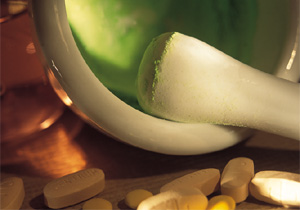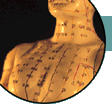Other Pathogenic Factors
Besides the previously mentioned pathogenic factors there are also
pathogenic factors relating to irregular food intake, over-strain and
stress or insufficient physical exertion, traumatic injuries, parasites,
and pathological products such as phlegm-humor and blood stasis.
1. Irregular Diet
Over-eating or hunger: Voracious eating or hunger may give rise to
disease. Hunger causes malnutrition and leads to an insufficient supply
of qi and blood, which causes general body weakness. Overeating damages
the digestive and absorptive functions, and manifests the symptoms of
epigastric and abdominal distension and pain, belching, acid
regurgitation, anorexia, vomiting, diarrhea, etc.
Partiality for a particular kind of food: Food intake should be
varied. In this way necessary nutrient substances are guaranteed.
Partiality to a particular food may bring on disease due to insufficient
nutrients. For example: long-term intake of polished white rice may
cause beriberi; long-term drinking of iodine-deficient water may cause
goiter; indulgence in spicy or boiling hot food may give rise to dryness
of the mouth, halitosis, diabetes, etc.; indulgence in smoking, alcoholic
drinks, or greasy and highly flavored food may produce pathological
phlegm indigestion, stuffy chest, excessive sputum, or boils and ulcers.
Intake of contaminated food: Eating contaminated, poisonous, or stale food (food poisoning) may impair stomach and intestinal functioning causing clinical manifestations such as epigastric and abdominal distension and pain, nausea, vomiting, borborygmus, diarrhea, etc.
Over-strain and stress or deficient physical exertion: Lack of physical exertion may cause retardation of qi and blood circulation, unhealthy zang-fu organs, general weakness, lassitude, anorexia, dizziness, palpitation, insomnia, etc., also a liability to contract diseases caused by exogenous pathogenic factors. Prolonged over-strain may bring on lassitude, weakness and tiredness of the four extremities, dizziness, hypersomnia, palpitation, spontaneous sweating, asthma or dyspnea due to physical exertion.
In addition, traditional Chinese medicine considers that excessive sexual activity consumes the kidney essence manifested by soreness and weakness of the knees, lumbago, dizziness and vertigo, ringing in the ears, lassitude and listlessness, or even spermatorrhea, impotence, and leukorrhea.
2. Traumatic Injuries and Parasites
Traumatic injuries include incisions, gunshot and sword wounds, scalds
and burns, contusions, sprains or animal stings and bites. Mild cases
that only sustain injuries to the skin include pain, bleeding, bruises,
and hematoma due to the obstruction of blood vessels. While severe cases
may include injuries to the tendons, bones, and internal organs
manifesting as joint dislocation, fracture, hemorrhage due to rupture
of the internal organs, prostration, etc.
3. Blood Stagnation and Phlegm-Humor
Blood Stagnation
Under normal conditions, blood circulates continually within the
blood vessels at a certain speed. Any retarded circulation of blood
or extravasated blood in spaces between the tissues
may form blood stasis. its syndromes are characterized as follows:
Pain
The pain location is fixed with local tenderness and has a stabbing or boring sensation.
Hemorrhage
Blood stagnation prevents normal flow inside the vessels causing extravasation and hemorrhage. The blood is often deep red or dark purplish.
Ecchymosis or Petechia
Blood stagnation subcutaneously forms ecchymosis or petechiae accompanied by local pain. Initially they present a red color, then change to purple or yellow, finally disappearing. If the tongue proper is purple, or ecchymosis or petechiae are present, this is significant in the diagnosis of diseases caused by blood stagnation.
Mass Tumor
Most mass tumors, especially large lumps in the abdominal cavity, are considered to be related to stagnation of the blood. The location of the tumors should be fixed and unmovable, accompanied by pain.
Phlegm-Humor
Phlegm-humor can form due to the accumulation of body fluids, therefore
it has a close relationship to functional disorders of the lung, spleen,
and kidney which control water metabolism. It may also be produced by an
over-indulgence in alcohol or fatty and highly flavored foods, leading
to stagnation of liver qi and derangement of the functional activities
of qi.
|

 This website is published, edited and designed by Raymond Cheng,
and reflects only and only his personal views and opinions in his individual capacity.
The information available at this website is not intended
directly or by implication to either diagnose or treat any
medical, emotional, or psychological condition or disorder.
It is also not intended to create a physician-patient relationship
between you and I or between you and Wyith Institute™ and The Office of Dr Raymond K K Cheng.
The information here is not a substitute for advice and treatment provided
by your physician or by another healthcare professional.
It is always recommended that consultation with local healthcare providers
be obtained for any of your specific health or medical concerns.
Furthermore, any products that can be purchased (yet you can see I don't have much
to sell here) through advertisers' banners or through links to other websites
are not either explicitly or implicitly given any warranty or endorsement
by me, my colleagues, Wyith Institute™ or any of its associated businesses.
This website is published, edited and designed by Raymond Cheng,
and reflects only and only his personal views and opinions in his individual capacity.
The information available at this website is not intended
directly or by implication to either diagnose or treat any
medical, emotional, or psychological condition or disorder.
It is also not intended to create a physician-patient relationship
between you and I or between you and Wyith Institute™ and The Office of Dr Raymond K K Cheng.
The information here is not a substitute for advice and treatment provided
by your physician or by another healthcare professional.
It is always recommended that consultation with local healthcare providers
be obtained for any of your specific health or medical concerns.
Furthermore, any products that can be purchased (yet you can see I don't have much
to sell here) through advertisers' banners or through links to other websites
are not either explicitly or implicitly given any warranty or endorsement
by me, my colleagues, Wyith Institute™ or any of its associated businesses.



 Thank you for visiting this TCM and acupuncture information website.
If you have previously been to this website, you might have
noticed that some of the pages on ancient historical ideas and
holistic thinkings related to Chinese metaphysics are temporarily taken offline.
This is because I will be revamping the whole website and be moving
those information into a new \"Ancient Chinese Culture\" section
so as to reflect a more current perspective on the interpretation
of some of the fundamental concepts as well as to include
some of the latest information in the area.
But if you have just found this website for the very first time, I welcome you again and
wish you could find what you require and, hopefully, you could also be benefitted
from reading the articles I published on this website.
Thank you for visiting this TCM and acupuncture information website.
If you have previously been to this website, you might have
noticed that some of the pages on ancient historical ideas and
holistic thinkings related to Chinese metaphysics are temporarily taken offline.
This is because I will be revamping the whole website and be moving
those information into a new \"Ancient Chinese Culture\" section
so as to reflect a more current perspective on the interpretation
of some of the fundamental concepts as well as to include
some of the latest information in the area.
But if you have just found this website for the very first time, I welcome you again and
wish you could find what you require and, hopefully, you could also be benefitted
from reading the articles I published on this website.